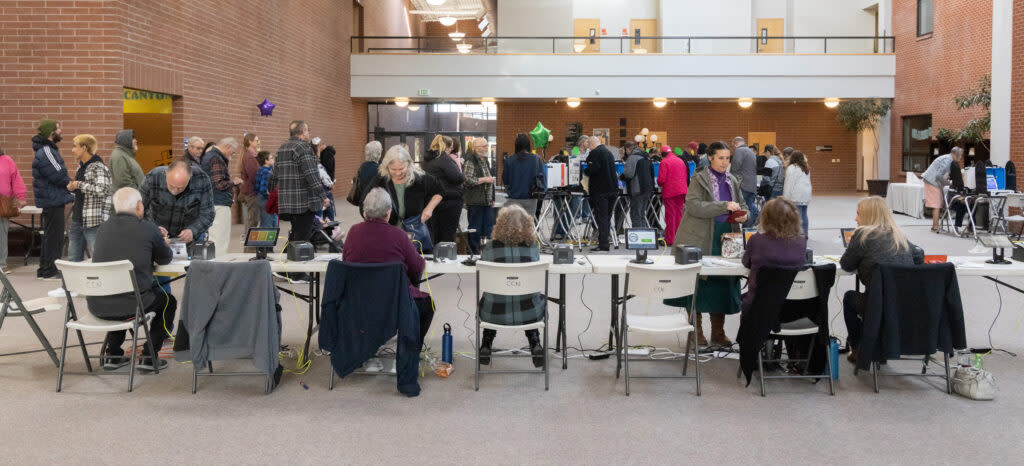It’s time for Idaho’s elected leaders to invest in election infrastructure

- Oops!Something went wrong.Please try again later.
Seated poll workers help Canyon County voters at a polling place at the College Church of the Nazarene on the NNU campus in Nampa, Idaho, on Nov. 8, 2022. (Otto Kitsinger for Idaho Capital Sun)
Thomas Jefferson famously wrote in the Declaration of Independence that, “Governments are instituted among Men, deriving their just powers from the consent of the governed.” This affirmation laid the groundwork for our nation’s democratic process, which remains the standard for the free world.
However, in recent years, federal support for our election infrastructure has failed to keep pace with the system’s evolving needs, leaving election workers across Idaho in in the unenviable position of administering secure, quality elections on steadily shrinking budgets.
Between fiscal years 2018 and 2020, the federal government appropriated anywhere from $380 million to $425 million in election infrastructure to furnish our election workers with badly needed equipment and staffing. Unfortunately, only $55 million was dedicated to this purpose in the recent fiscal year 2024 appropriations package, which does little to make a dent in the growing backlog of urgent needs across the country.
As the executive director of the Association of Idaho Cities, I strive to promote excellence and strengthen the services our city governments deliver to communities throughout our great state. One of our top priorities is bolstering the operations of Idaho’s voting system and safeguarding the integrity of our elections. The work our state and local election officials undertake paired with critical investment from our federal leaders helps to optimize the voting experience for Idaho’s residents and improve working conditions for poll workers.
Recent reductions in federal funding have translated into election facilities that lack fundamental services like heat and internet access. Our elections, which have continued to run smoothly under strained conditions, depend on the dedicated efforts of our local poll workers. The least we can do is provide them with the necessities to do their jobs.
In addition to these deficiencies, much of Idaho’s voting technology is alarmingly outdated. Modern computers that run on updated operating systems are a luxury in voting locations in some areas of our state. This is a growing concern as bad actors abroad ramp up efforts to interfere in U.S. elections and attempt to erode confidence in the integrity of our democratic process.
Throughout my career, I have unapologetically advocated for keeping our nation’s fiscal house in order. I also believe that the federal government’s primary function is strengthening our national security and keeping Americans safe from those that wish us harm. Reinvesting in our election infrastructure will provide state and local election offices with adequate resources to continue administering safe and secure elections, which serve as the foundation for all of the other fruits of our democracy.
Returning to the funding level advanced in previous years is a good start. Congress should make it a point to enact $400 million for election infrastructure in fiscal year 2025 to help Idaho’s election officials modernize our election system and keep up with foreign threats.
Idaho’s elected leaders must step up to the plate to ensure this $400 million for election infrastructure is secured as Congress begins work on the fiscal year 2025 appropriations process. Strong federal investment in national security imperatives like election security is sound policy and it is more important than ever.
GET THE MORNING HEADLINES DELIVERED TO YOUR INBOX
The post It’s time for Idaho’s elected leaders to invest in election infrastructure appeared first on Idaho Capital Sun.

